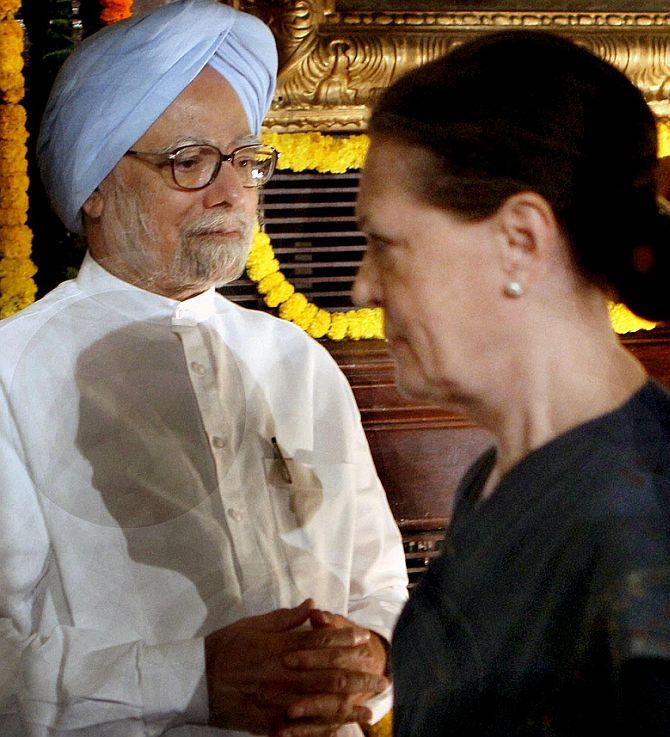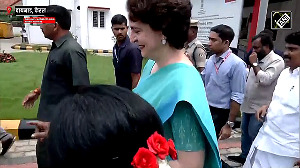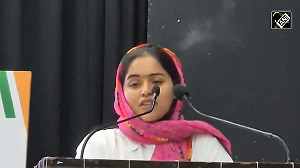 'Good politics is not just staying in power. You cannot sacrifice everything at the altar of trying to ensure the coalition remains in power.'
'Good politics is not just staying in power. You cannot sacrifice everything at the altar of trying to ensure the coalition remains in power.'
It was the alleged scams highlighted by then Comptroller and Auditor General Vinod Rai and his team of auditors that led to the undoing of the United Progressive Alliance II and the humiliating defeat of the Congress party in the 2014 election.
A year after retiring from the post, Rai, bottom, left, has published a memoir, Not Just An Accountant which has been kicking up a storm in political circles.
Rashme Sehgal spoke exclusively to the former CAG for Rediff.com
You pegged the 2G spectrum 'scam' loss at Rs 1.76 lakh crore; the Coalgate 'scam' at Rs 1.45 lakh crore. The alleged loss incurred by Air India in the Boeing deal at thousands of crores of rupees. Dr Manmohan Singh was better placed to know about the quantum of losses, yet he did nothing about it.
I wish I could give an answer to that. The people in the government and the administration need to shed answers to what was going on.
All we did was to take the figure in 2008 at which telecom licenses had been distributed and the 2010 figure at which the 3G licenses had been given and worked out the difference between the two.
Nothing more, nothing less.
Your book has squarely put the blame on Dr Singh for giving his acquiescence in the 2G and Coalgate 'scams'.
Yes, I am putting all the blame at the prime minister's doorstep. There is no way he can shirk responsibility. If he had taken a different view, the fate of the government would have been different.
Maybe he had his own compulsions, but you cannot sacrifice everything at the altar of trying to ensure the coalition remains in power.
He was the team leader; the ultimate blame and responsibility would lie with him.
In your book you write that the prime minister agrees to the advice of then coal secretary P C Parakh to switch over to auctioning of coal blocks only to have minister of state for coal Dasari Narayana Rao over-rule his decision. This is unprecedented.
This is an issue that an auditor can hardly comment on. The prime minister takes a view. His minister goes back and says, 'No, that is not a route we will take.' My question: What was happening?
Did Dasari Narayana Rao have a vested interest in continuing with the earlier policy?
I cannot say that he had a vested interest. All I can say is that it was a very cosy arrangement, which suited both sides. Congress leader Sanjay Nirupam says he will take you to court because you named him as one of the MPs who used unparliamentary language during the Public Accounts Committee meeting.
Congress leader Sanjay Nirupam says he will take you to court because you named him as one of the MPs who used unparliamentary language during the Public Accounts Committee meeting.
These summons have not reached me yet. I welcome it. This gives me an opportunity to put in the public domain a lot of things I have not brought out in the book.
I was the sitting CAG when three members of the PAC called me names.
They said I am a fraud.
I had not named them in my book, but these are Congress MPs. They wanted me to withdraw and re-submit the report.
The discussions in the PAC are secret, but if Nirupam takes me to court I can request the Speaker to give me a copy of the proceedings only to place before the court.
Are PAC proceedings documented as is the case with the Lok Sabha and Rajya Sabha proceedings?
It is all documented. It is on the record. In my book, I have alluded to a ruling of a former Speaker who insisted (then defence minister) V K Krishna Menon apologise for making disparaging remarks on the CAG head.
It must have been very demoralising for you to sit at the PAC meetings and be humiliated in this manner.
I would stoically sit through those meetings. I had expected that the experts would disagree with my report on merit. But this was not the case.
Then telecom minister Kapil Sibal was also critical of your 2G figure...;
Sibal disputed my computation.
Our report focused on three issues. First, that (then telecom minister) Andimuthu Raja did not follow the procedures which had been laid down. Second, that he shifted the time lines; and third was about the computation of the loss.
These MPs (in the PAC) are relatively young. They could have been cautioned that this is not the way to talk to a CAG official.
The MPs have parliamentary privileges. The judiciary has judicial privileges. What protection does a supposedly-Constitutional authority have?
They were all big people who had been in the government for years. Instead of going into the merits of the case, they were trying to be personal.
Why did PAC Chairman Murli Manohar Joshi not step in and defend you?
I cannot say why he did not intervene.
But to go back to my earlier query, how were these 'scams' allowed to go through? The prime minister has a PMO and a battery of advisers to advise him.
I don't want to comment on them. This is a collective response of the prime minister and his council of ministers. As I have said earlier, good politics is not just staying in power. But all that is just conjecturing.
What were the circumstances, the exact environment under which these decisions were taken is something that is difficult for me to comment. What made you write this book?
What made you write this book?
After I retired in May 2013, I thought I had put the CAG saga behind me. I did not want to open this chapter, but rather to pursue my other interests which in common parlance is being part of the lecture circuit. It meant travelling abroad and giving lectures on financial sector reforms, ethical governance and so on.
But the innuendos were not dying down.
Manish Tewari referred it to the 'R Virus' and Jairam Ramesh in an interview described me as the 'Bhumihar from Ghazipur.'
All these insinuations were affecting the morale of the people in the CAG.
So I thought the time had come for me to put things in perspective. I just converted the reports into simple language. My book targets the younger generation, which is much more discerning and needs to know what governance is all about.
Do you feel vindicated now that the Supreme Court has also put a question mark on the coal block allocations?
We were not looking for vindication. All our systems in CAG are very robust. The Supreme Court has been very supportive right through as has the media.
Did you receive any support from Congress President Sonia Gandhi and Rahul Gandhi?
The Gandhi family does not come into the picture. They are not part of the government. Pranab Mukherjee supported us any number of times. Then finance minister Chidambaram answered a parliamentary question in which he said the functioning of the CAG was fine.
Was that enough?
That was hardly enough.
Former civil aviation minister Praful Patel has also threatened to take you to court over your comments on the Boeing deal.
The prime minister takes a view. His minister goes back and says, 'No, that is not a route we will take.' My question: What was happening?
"
He is welcome to. Everyone was aware that an increased purchase of the number of planes would create a financial crisis for Air India, especially when the purchase had a debt proportion of 97 per cent. There was no way it could be termed commercially profitable.
Is it enough to say that the decision to buy the aeroplanes was misplaced? Does this mean that such a decision has no accountability? Rs 40,000 crore of government money has gone down the drain.
Your book highlights how Air India had a team of experts who were competent to take a decision on this subject, but were over-ruled.
My point is on what basis was a body of experts, who were technically and commercially more savvy, made to increase the purchase of planes from 28 to 68 aircraft.
There was also a question of giving foreign airlines space while depriving our own airline of space.
Why is it that you have not taken on Mukesh Ambani on the KG Basin gas sale?
Mukesh Ambani cannot be more powerful than the prime minister. I have taken on the prime minister. No one can be more powerful than the prime minister.
My case is that Ambani is a businessman. He succeeded in getting gas on his own terms and the government gave in to him.
Ambani demanded concessions and the government acquiesced to all his demands.
The government was subjugating its own interest to his interest. Which businessman will say no to such an arrangement?
Nevertheless, you fail to mention his name in your book.
I am writing from the standpoint of being an auditor. I looked at the terms of the contract which was skewed in his favour.
We did also point out that the price cannot be changed during the tenure of the contractual arrangement.
All the major decisions were taken in his favour.
Has there been any course correction on the government's part?
Not that I have seen it. I hope course correction will come about. I am not seeking laurels or kudos, but have examined all issues on merit.
Why are we willing to give away our resources so cheaply?
Indeed whether it is spectrum or coal -- all these resources are finite. Once you give them away, you cannot get them back. This is what beats you.
These are critical resources, high priority issues and yet they were handled in this manner.
Do you feel the prime minister did not put his foot down because he had grown too old?
That is not a fair comment. I don't want to sit in judgment. My personal interactions were very limited. I cannot make an assessment. All the issues I have raised have been on merit.
Where is the question of a man like me targeting a man of the stature of the prime minister?
Let anyone up there turn around and say what I did was not right.
The government didn't seem to be operating -- somewhere things had become dysfunctional.
But you have been quoted as saying that Dr Singh replied to A Raja's letters, but not to yours?
That's a fact. I wrote a letter to him, but did not get even an acknowledgement.
There are rumours doing the rounds that you are close to the BJP and plan to join the party soon.
There is nothing of the sort. People may insinuate that I have political ambitions.
There are good people in politics, but politics is not my cup of tea.
How about your joining the Rajya Sabha?
I have made it very clear. I have no interest in politics.
Main Image: Then prime minister Dr Manmohan Singh, left, with Congress President Sonia Gandhi.






